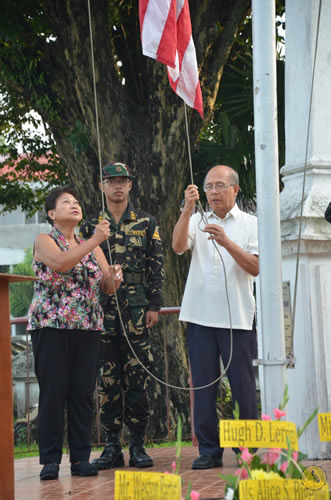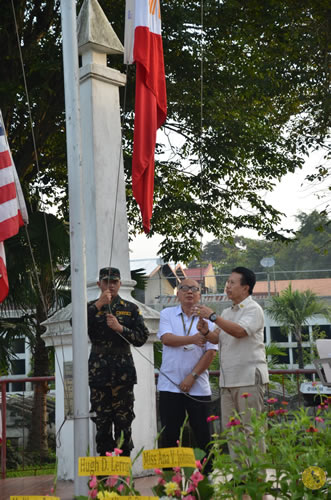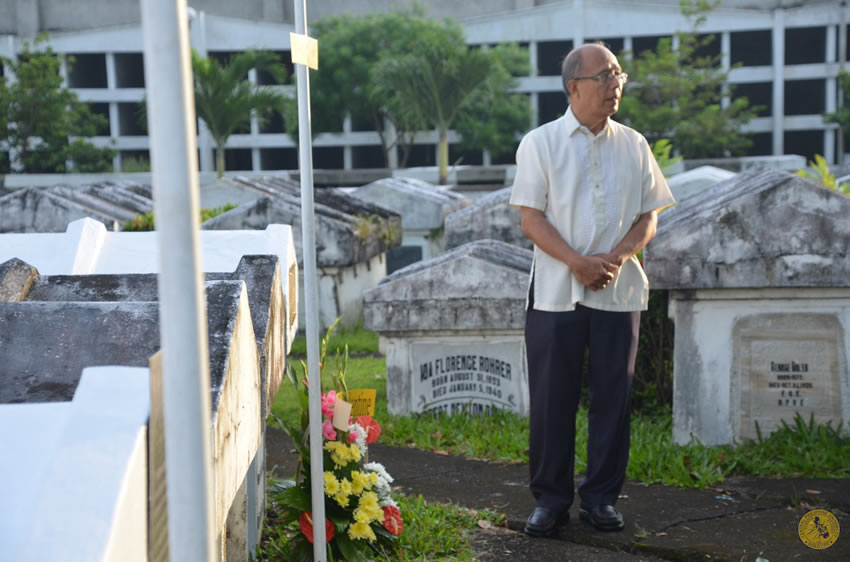By Keziah G. Huelar

CPU President, Dr. Teodoro C. Robles, and Ms. Flora Grace G. Cudiamat, President, CPU Federation of Overseas Alumni Association raising the American flag.
Remembering and honouring the founders of Scientia et Fides—Celebrating its 113th founding anniversary, Central Philippine University held a memorial service in honor of the American Baptist missionaries, who dedicated their time, talent, and treasure to establish CPU. The memorial service took place at the Philippine American Cemetery on October 1, 2018.
The invocation was led by Rev. Cris Amorsolo V. Sian, Senior Pastor, University Church. It was then followed by the flag raising ceremony; the Philippine flag was raised by Rev. Joniel Howard H. Gico, CPU Vice President for Student Affairs and Engr. Isagani J. Jalbuena, President, CPU Alumni Association, Inc. while the American flag was raised by CPU President, Dr. Teodoro C. Robles, and Ms. Flora Grace G. Cudiamat, President, CPU Federation of Overseas Alumni Association.

Rev. Joniel Howard H. Gico, CPU Vice President for Student Affairs and Engr. Isagani J. Jalbuena, President, CPU Alumni Association, Inc. raising the Philippine flag.
This was followed by the singing of the hymn, “Praise to the Lord, the Almighty” and the responsive reading led by Ms. Carmelle Frances M. Romero, Administrative Officer, Office of the President. After which, the floral offering was led by Dr. Robles as a musical tribute was played by Ms. Crista S. Huyong, Director, CPU Cultural Affairs Office, on organ and Mr. John P. de Guzman, an alumnus, on violin. The singing of the hymn of commitment, “Find Us Faithful,” was then led by Ms. Hermely A. Jalando-on, Purchasing Officer.
CPU was founded in 1905 as the Jaro Industrial School by missionaries of the American Baptist Foreign Mission Society. It started as an Elementary Vocational School for poor boys who worked for their board and tuition.
Rev. Dr. William O. Valentine, the first principal, worked hard to have the school incorporated and recognized by the government. His objectives were realized in 1913, the same year when the school began to admit female students. In 1915, the first two years of high school were opened. In 1920, the third and fourth year classes were added and the following year, the first batch of high school graduates were honored.

A moment of reflection – CPU President, Dr. Teodoro C. Robles at the Philippine-American Cemetery after laying the wreath.
To satisfy the growing desire of young people for education, a junior college was opened in 1923 and the name of the school was changed to Central Philippine College. The senior college was established in 1936 and by 1940, five degrees were offered: Bachelor of Arts, Bachelor of Science, Bachelor of Education, Bachelor of Theology, and Bachelor of Religious Education.
The war broke out in the mid-1940’s, and with it, the destruction of the college buildings. Eleven American missionaries were killed. Centralian students, faculty and staff members, and alumni joined the guerrilla movement or the Civil Resistance Government. Many of them laid down their lives for democracy and freedom.
The “Central Spirit” however did not die in the night that was World War II. As soon as war ended, the college was reopened by loyal faculty members and returning missionaries who were caught by the war in America. Destroyed buildings were reconstructed and new ones were built with funds from friends at home and abroad. Post-war reconstruction resulted in a well-laid, attractive campus.
April 1, 1953 was an important landmark in the whole CPU story. On that day, the ardent dream of thousands of alumni and of the long line of American and Filipino pioneers became a reality: Central Philippine College gained university status and became Central Philippine University.
From the founding of the school, Filipinos were gradually given larger responsibilities in the administration of the University. In 1966, the first Filipino president, Dr. Rex D. Drilon, was elected; and in 1969 the entire University property—land, buildings, and equipment—was turned over by the American Baptist Foreign Mission Society to the Filipino corporation of CPU. Since 1973, all members of the Board of Trustees and administrative officials of the university have been Filipinos.
